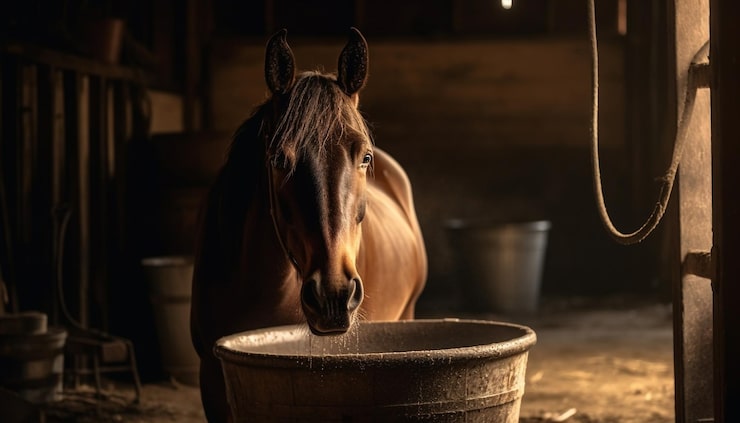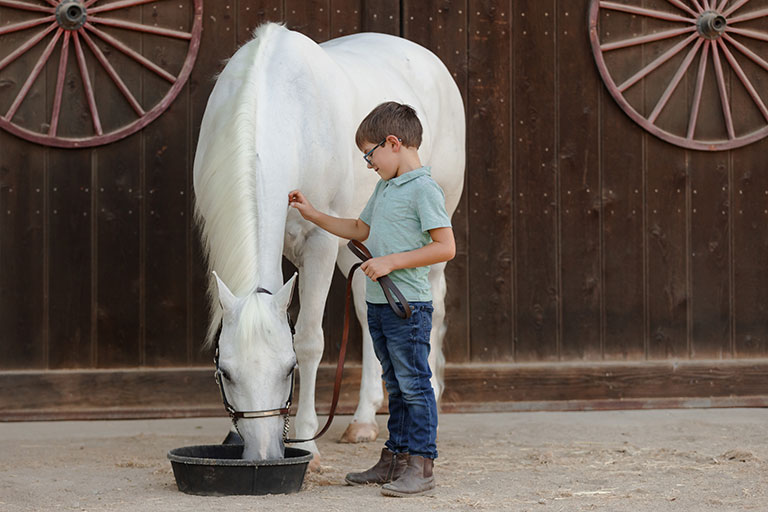As horses age, their grooming needs evolve. Understanding the senior horse grooming tips is crucial for maintaining the health and well-being of your cherished equine companion. Proper grooming not only enhances the horse’s appearance but also contributes to its overall health, comfort, and quality of life.
In this article, we’ll delve into the essential aspects of grooming older horses, ensuring they remain comfortable and vibrant in their golden years.

Understanding Senior Horse Grooming Needs
Older horses require special attention when it comes to grooming. Their skin becomes more sensitive, and they might develop conditions that younger horses don’t face. Regular grooming sessions become an opportunity to monitor their health closely, ensuring that any issues are identified and addressed promptly.
1. Importance of Regular Grooming
Grooming is not just about keeping your horse looking good. It’s an essential part of their health care routine. Regular grooming helps in detecting diseases, injuries, or parasites early. For senior horses, whose immune systems may not be as robust, this early detection is particularly vital.
2. Choosing the Right Tools
Using the appropriate grooming tools is crucial. Soft-bristled brushes are recommended for older horses with sensitive skin. Curry combs should be used gently to avoid irritation. Additionally, high-quality shampoos and conditioners designed for senior horses can help maintain their coat’s health and shine.
Bathing Your Senior Horse
Bathing is a key component of senior horse grooming tips. However, it’s important to consider the frequency and method of bathing to avoid stripping natural oils from their coat.
1. How Often to Bathe?
Unlike younger horses, senior horses should not be bathed too frequently. Aim for a bath every few weeks, or when they are particularly dirty. Over-bathing can lead to dry skin and loss of essential oils.
2. Use of Mild Shampoos
Choose mild, hypoallergenic shampoos that are specifically formulated for older horses. These shampoos contain ingredients that help maintain skin moisture and coat health.
Brushing and Detangling
Regular brushing is critical to remove dirt, debris, and loose hair. It also stimulates blood circulation, which is particularly beneficial for senior horses.
1. Regular Brushing Techniques
Brush in the direction of the hair growth to prevent skin irritation. Use a soft brush for sensitive areas, such as the face and legs.
2. Dealing with Mane and Tail
Older horses may have more brittle mane and tail hair. Use a detangler spray to gently work through knots. A wide-toothed comb is preferable over a brush to minimize hair breakage.
Hoof Care for Senior Horses
Proper hoof care is essential for the mobility and comfort of older horses. Regular cleaning and inspection can prevent common hoof issues.
1. Regular Hoof Cleaning
Check hooves daily for stones, debris, or signs of thrush. Use a hoof pick carefully to clean out the frog and sole, being mindful of sensitive areas.
2. Professional Hoof Trimming
Schedule regular visits with a farrier to ensure the hooves are trimmed and balanced correctly. This helps prevent lameness and other hoof-related issues.
Monitoring Skin Health
Senior horses are prone to skin conditions such as dermatitis and fungal infections. Regular grooming allows you to check for any abnormalities.
1. Identifying Skin Issues
Look for signs of irritation, unusual lumps, or dry patches. Consult a veterinarian if you notice anything concerning.
2. Applying Skin Treatments
Use veterinarian-recommended ointments or creams to treat any skin issues. Keeping the coat clean and moisturized can prevent many common skin problems.
Dental Care for Older Horses
While not directly related to grooming, dental care is a critical component of overall health for senior horses.
1. Regular Dental Check-Ups
Schedule regular dental check-ups to address tooth wear, sharp edges, or other oral health issues that can affect eating and digestion.
2. Signs of Dental Problems
Watch for signs of dental issues such as difficulty eating, weight loss, or excessive drooling. Early intervention can prevent more serious health problems.
Nutrition and Hydration
Proper nutrition and hydration play a vital role in maintaining the coat and skin health of senior horses.
1. Balanced Diet
Provide a diet rich in essential vitamins and minerals. Senior horse feed is formulated to meet the specific nutritional needs of older horses. Digestive support is also crucial to ensure they absorb nutrients effectively.
2. Ensuring Adequate Hydration
Ensure that your horse has constant access to clean, fresh water. Dehydration can lead to a dull coat and health issues.
Exercise and Mobility
Exercise is important for maintaining muscle tone and joint health in senior horses.
1. Suitable Exercise Routines
Engage your horse in light exercise routines tailored to their capabilities. Older horses benefit from regular, gentle exercises like walking or trotting.
2. Monitoring Mobility
Keep an eye on your horse’s mobility and adjust their activity level accordingly. If you notice any signs of discomfort, consult with a veterinarian.
Creating a Comfortable Environment
Providing a comfortable living environment is crucial for the well-being of senior horses.
1. Appropriate Bedding
Use soft bedding to support their joints and prevent sores. Bedding choices like straw or shavings can provide the comfort they need.
2. Shelter from Weather
Ensure that your horse has access to shelter from harsh weather conditions, whether it’s the scorching sun or freezing temperatures.
Regular Health Check-Ups
Regular veterinary check-ups are essential for monitoring the health of senior horses.
1. Importance of Annual Check-Ups
Annual check-ups help detect potential health issues early. Regular check-ups allow for timely interventions and adjustments to their care routine.
2. Vaccinations and Parasite Control
Ensure your horse receives the necessary vaccinations and parasite control treatments. These are critical to maintaining their health and preventing diseases.
Conclusion
Incorporating these senior horse grooming tips into your care routine can significantly enhance the quality of life for your older equine companion. Regular grooming, combined with proper nutrition, exercise, and veterinary care, ensures that your senior horse remains healthy and happy.
For more detailed information on caring for senior horses, you can explore resources like AAEP’s tips for caring for older horses and Virbac’s guide to senior horse care.

Frequently Asked Questions
1. How often should I groom my senior horse?
It’s recommended to groom your senior horse at least three to four times a week to ensure their coat remains clean and healthy.
2. What are common skin issues in senior horses?
Senior horses often face skin issues like dermatitis, fungal infections, and dry patches. Regular grooming and inspection can help detect these early.
3. Why is dental care important for older horses?
Dental care is crucial as it affects their ability to eat and digest food properly. Regular check-ups help prevent weight loss and other health problems.
This article contains affiliate links. We may earn a commission at no extra cost to you.
